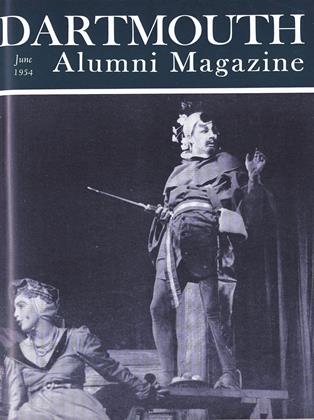IN December 1952 President Dickey appointed the Dartmouth Television Committee to survey all aspects of television "in the life and work of the Dartmouth community," and in particular to consider (1) the likely future role of television in formal and informal education in the College and (2) the responsibilities Dartmouth might have to participate in the use of television in the service of a larger public. Of central importance in the deliberations of the Committee, headed by Warner Bentley, graduate manager of the Council on Student Organizations, was the question of what Dartmouth should do about the educational TV channel it had applied for and received from the Federal Communications Commission.
The written report of the Television Committee, submitted to President Dickey in January, was a major item for discussion at the spring meeting of the Dartmouth Board of Trustees. The formal recommendations before the Board were four in number:
(1) That the appropriate authorities of the College approve in principle the activation of Educational Television Channel 21 by the College. ,
(2) That efforts be started to secure sufficient funds to install and operate a television transmitter with antenna and tower and minimum facilities to enable the transmitting of motion picture films and kinescope films, and to secure, if possible, commitment for additional funds for financing more extensive operations.
(3) That if the foregoing recommendations are approved, and if the prospect of obtaining sufficient funds seems good, the services of a Director of Television at Dartmouth be secured on a trial basis to make a study of the steps necessary to activate Channel 21 and to make detailed recommendations on how to proceed.
(4) That a microwave relay link to Boston be definitely included in long-range planning.
The Trustees accepted the Committee's report and voted to approve its recommendations in principle. In writing to make the Board's action known to Orton H. Hicks '21, chairman of the alumni advisory group which worked with the Hanover committee, President Dickey stated. "As we all recognize, there are some very large problems which stand in the way of the College's becoming a producer of educational television in the near future, but I am confident that these problems can, and will, be met if the great promise of this medium for educational purposes is borne out in future developments."
Perhaps the best way to summarize the Television Committee's report is to say that it also fully recognizes the financial, technical and operating problems of an educational television station, yet feels that Dartmouth in the future can not afford to lessen its educational quality by being among those institutions which lack the technical facilities or the imagination to adapt television to their purposes. A significant paragraph appears in the introduction to the report:
"Despite a profound skepticism widely shared at the outset within the Committee as to the usefulness of television to an institution such as Dartmouth; despite a fundamental reluctance to encourage an adventure by the College along a course which is, not only untested in our own indigenous educational practices but is likewise largely untried, at least conclusively, in the entire sphere of American education; despite the difficulties of pinning down many of the facts, to say nothing of the issues; and despite knowledge of the very considerable outlay of funds and manpower inevitably involved, the Committee has come gradually to the conclusion that the potentials of television in education are so enormous that it is likely that no institution of higher education will in the future be regarded as fully capable of realizing its purposes without having in some fashion made this instrument its servant- The only real questions to be resolved, in the opinion of the Committee, are how far and how fast Dartmouth should go in adapting television to its ends."
There are several parts of the Television Committee's detailed and far-ranging report that we would like to quote, and the ALUMNI MAGAZINE hopes to give a fuller summary of the Committee's survey and conclusions in another issue. The main thing to report at this time is that the Television Committee proposes, with Trustee agreement in principle, that the College should take positive and imaginative steps to use television for its educational program and community responsibilities. The details involved in putting this into practice are rather overwhelming, but a bold general course has been charted.
In addition to Mr. Bentley as chairman, the Television Committee included Robert L. Allen '45, secretary; Prof. Almon B. Ives; Prof. Millett G. Morgan; Richard W. Morin '24, College librarian; Prof. Hugh S. Morrison '26; and J. Blair Watson Jr., director of Dartmouth College Films.
 View Full Issue
View Full Issue
More From This Issue
-
 Feature
FeatureTHE EXPERIMENTAL THEATRE
June 1954 By HENRY B. WILLIAMS -
 Feature
FeatureNature Conditions Architecture
June 1954 By EDGAR H. HUNTER JR. '38, -
 Class Notes
Class Notes1918
June 1954 By ERNEST H. EARLEY, RICHARD A. HOLTON -
 Class Notes
Class Notes1926
June 1954 By HERBERT H. HARWOOD, ANDREW J. O'CONNOR, Richard Eberhart '26 -
 Article
ArticleThe Faculty
June 1954 By HAROLD L. BOND '42 -
 Class Notes
Class Notes1905
June 1954 By GEORGE W. PUTNAM, FLETCHER A. HATCH
Article
-
 Article
ArticleTOWN TO SPEND $12,000 ON IMPROVEMENT FOR BRIDGE
NOVEMBER, 1926 -
 Article
ArticleANNUAL MEETING OF SECRETARIES—MAY 4-5, 1928
FEBRUARY, 1928 -
 Article
ArticleA Wah Hoo Wah for –
JANUARY 1959 -
 Article
ArticleA Wah Hoo Wah for-
NOVEMBER 1967 -
 Article
ArticleBelinda
MARCH 1963 By ALEXANDER LAING '25 -
 Article
ArticleTo Men of Dartmouth
October 1945 By John Sloan Dickey.

